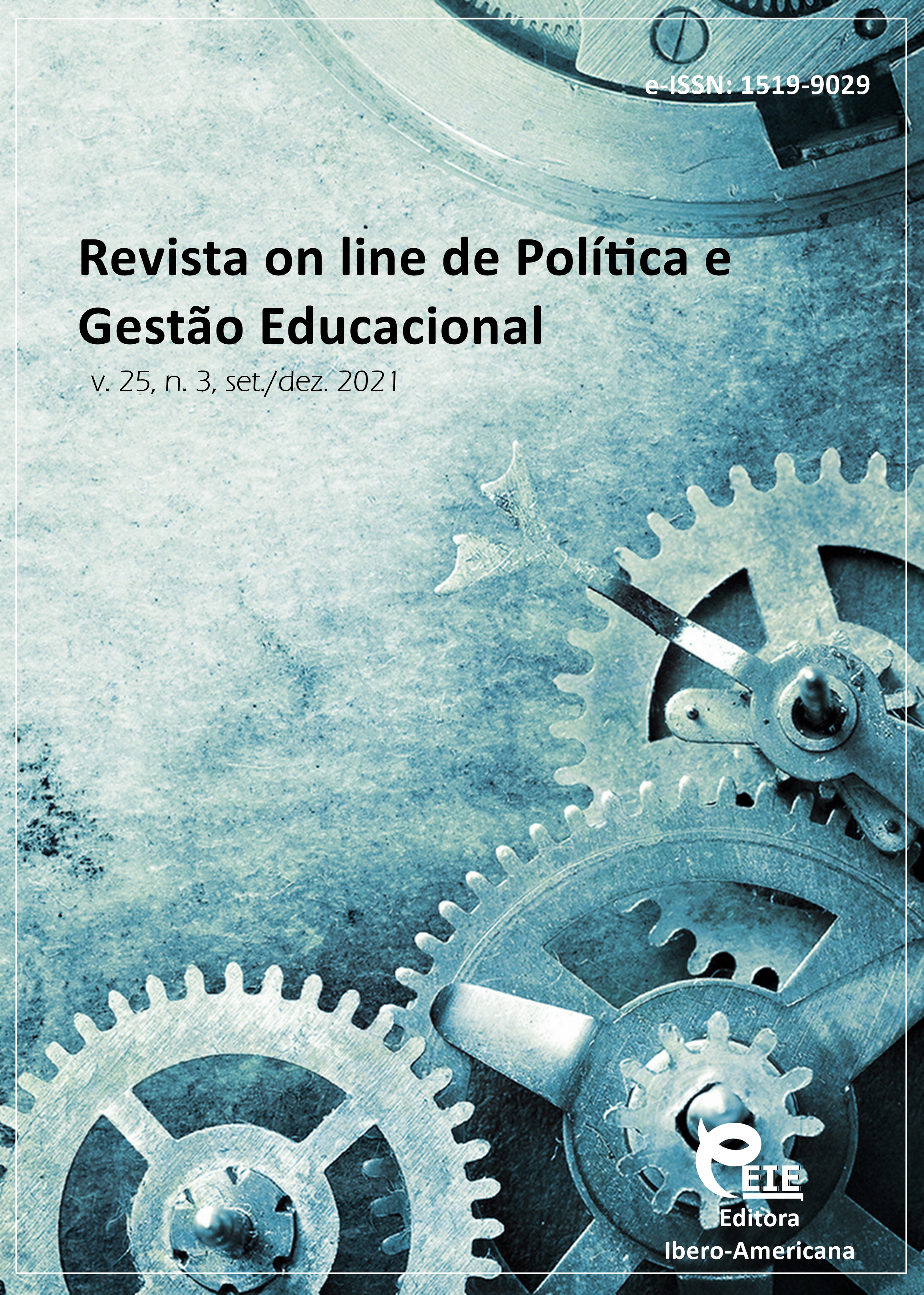A utilização da tecnologia de aprendizagem híbrida na formação dos estudantes de especialidades pedagógicas
DOI:
https://doi.org/10.22633/rpge.v25i3.15958Palavras-chave:
Aprendizagem híbrida, Aprendizagem tradicional, Aprendizagem assistida por computadorResumo
Este estudo visa estabelecer a eficácia da utilização da tecnologia de aprendizagem híbrida, seu impacto no sucesso dos candidatos ao ensino superior e a qualidade do ensino em geral. Além disso, a tecnologia pedagógica foi avaliada pelos participantes do processo educativo. Os principais métodos são o método da experiência pedagógica e a entrevista para pesquisa teórica utilizando métodos descritivos, síntese e análise. A hipótese principal é que a aprendizagem híbrida é uma tecnologia pedagógica eficaz, conveniente e eficiente, e uma componente necessária da educação universitária moderna. O resultado da experiência pedagógica deve estabelecer o nível de eficácia da tecnologia da educação híbrida para os estudantes de especialidades pedagógicas nas condições do paradigma educacional moderno. No futuro, vale a pena continuar a desenvolver o conceito inovador de aprendizagem hibrida na prática educacional, numa combinação harmoniosa de aprendizagem online e offline.
Downloads
Referências
BOELENS, R.; WEVER, B.; VOET, M. Four key challenges to the design of blended learning: A systematic literature review. Educational Research Review, Regensburg, v. 22, p. 1-18, 2017. DOI: https://doi.org/10.1016/j.edurev.2017.06.001
BROADBENT, J. Comparing online and blended learner’s self-regulated learning strategies and academic performance. The Internet and Higher Education, Hong Kong, v. 33, p. 24-32, 2017. DOI: https://doi.org/10.1016/j.iheduc.2017.01.004
CAVUS, N.; IBRAHIM, D. Learning English using children’s stories in mobile devices. British Journal of Educational Technology, Manchester, v. 48, n. 2, p. 625-641, 2017. DOI: https://doi.org/10.1111/bjet.12427
FINDIK, C.; OZKAN, S. A model for instructors’ adoption of learning management systems: empirical validation in higher education context. Turkish Online Journal of Educational Technology, Sakarya, v. 12, n. 2, p. 13-25, 2013. Available: http://tojet.net/articles/v12i2/1222.pdf. Access: 14 Oct. 2021.
GENG, S.; LAW, K. M. Y.; NIU, B. Investigating self-directed learning and technology readiness in blending learning environment. International Journal Education Technology High Education, Barcelona, v. 16, 2019. DOI: https://doi.org/10.1186/s41239-019-0147-0
HONG, J.-C. et al. Using a “prediction–observation–explanation” inquiry model to enhance student interest and intention to continue science learning predicted by their Internet cognitive failure. Computers & Education, Tempe, v. 72, p. 110-120, 2014. DOI: https://doi.org/10.1016/j.compedu.2013.10.004
IVANOVA, I.; MOSENKIS, I. L.; STROKAL, O. M. Modern media pedagogy: Ways of forming public journalism in Ukraine. Asia Life Sciences, v. 22, n. 2, p. 357-370, 2020. Available: http://repository.hneu.edu.ua/handle/123456789/24918. Access: 20 Sept. 2021.
JONES, J. F. From silence to talk: Cross-cultural ideas on students participation in academic group discussion. English for Specific Purposes, Atlanta, v. 18, n. 3, p. 243-259, 1999. DOI: https://doi.org/10.1016/S0889-4906(97)00059-8
KARPUSHYNA, M. et al. Creating meaningful foreign language environment by means of content-based starters. Universal Journal of Educational Research, San Jose, v. 7 n. 12, p. 2710-2716, 2019. DOI: https://doi.org/10.13189/ujer.2019.071219
KIKI-PAPADAKIS, K.; CHAIMALA, F. The embedment of responsible research and innovation aspects in European science curricula. Revista Românească pentru Educaţie Multidimensională, v. 8, n. 2, p. 71-87, 2016. DOI: https://doi.org/10.18662/rrem/2016.0802.06
KO, J.; SAMMONS P.; BAKKUM, L. Effective Teaching: a review of research and evidence. Reading: CfBT Education Trust, 2013.
KOSTIKOVA, I. et al. Teaching English speaking for FCE: using Facebook as a tool of instructional practice. Amazonia Investiga, Florencia, v. 8, n. 22, p. 719-727, 2019. Available: https://amazoniainvestiga.info/index.php/amazonia/article/view/825/773. Access: 20 Sept. 2021.
MASON, R. Learning technologies for adult continuing education. Studies in Continuing Education, Sydney, v. 28, n. 2, p. 121-133, 2006. DOI: https://doi.org/10.1080/01580370600751039
MTEBE, J. S.; RAISAMO, R. Challenges and instructors’ intention to adopt and use open educational resources in higher education in Tanzania. The International Review of Research in Open and Distributed Learning, Athabasca, v. 15, n. 1, p. 249-271, 2014. DOI: https://doi.org/10.19173/irrodl.v15i1.1687
PATIL, Z. N. Rethinking the objectives of teaching English in Asia. Asian EFL Journal, Niigata, v. 10, n. 4, p. 227-240, 2008. Available: https://www.asian-efl-journal.com/main-editions-new/rethinking-the-objectives-of-teaching-english-in-asia/index.htm. Access: 2 Sept. 2021.
PORTER, W. W. et al. A qualitative analysis of institutional drivers and barriers to blended learning adoption in higher education. The Internet and Higher Education, Hong Kong, v. 28, p. 17-27, 2016. DOI: https://doi.org/10.1016/j.iheduc.2015.08.003
RABABAH, І. H. M. The reality of using modern teaching methods in teaching Arabic for speakers of other languages from teachers’ perspective. Journal of Social Sciences, Houston, v. 9, n. 1, p. 58-94, 2020. DOI: https://doi.org/10.25255/jss.2020.9.1.58.94
SALGUR, S. A. The importance of the teacher in intercultural education. International Journal of Global Education, Famagusta, v. 2, n. 1, p. 1-5, 2013. Available: http://www.ijge.net/index.php/ijge/article/view/41. Access: 20 Sept. 2021.
SIM, M.; POP, A. The impact of social media on vocabulary learning: Case study Facebook. Annals of the University of Oradea. Economic Science Series, v. 23, n. 2, p. 120-130, 2014. Available: https://ideas.repec.org/a/ora/journl/v2y2014i2p120-130.html. Access: 20 Sept. 2021.
STOCKWELL, B. et al. Blended Learning Improves Science Education. Cell, Cambridge, v. 162, n. 5, p. 933-936, 2015. DOI: https://doi.org/10.1016/j.cell.2015.08.009
VANSLAMBROUCK, S. et al. Students’ motivation and subjective task value of participating in online and blended learning environments. The Internet and Higher Education, Hong Kong, v. 36, p. 33-40, 2018. DOI: https://doi.org/10.1016/j.iheduc.2017.09.002
VYKHRUSHCH, A. V. et al. Development of information culture of students of humanitarian specialities. Information Technologies and Learning Tools, Kyiv, v. 72, n. 4, p. 152-167, 2019. DOI: https://doi.org/10.33407/itlt.v72i4.2922
YILMAZ, R. Knowledge sharing behaviors in e-learning community: Exploring the role of academic self-efficacy and sense of community. Computers in Human Behavior, Quebec, v. 63, p. 373-382, 2016. DOI: https://doi.org/10.1016/j.chb.2016.05.055
Downloads
Publicado
Como Citar
Edição
Seção
Licença
Copyright (c) 2021 Revista on line de Política e Gestão Educacional

Este trabalho está licenciado sob uma licença Creative Commons Attribution-NonCommercial-ShareAlike 4.0 International License.
Manuscritos aceitos e publicados são de propriedade da Revista on line de Política e Gestão Educacional. É vedada a submissão integral ou parcial do manuscrito a qualquer outro periódico. A responsabilidade do conteúdo dos artigos é exclusiva dos autores. É vedada a tradução para outro idioma sem a autorização escrita do Editor ouvida a Comissão Editorial Científica.











